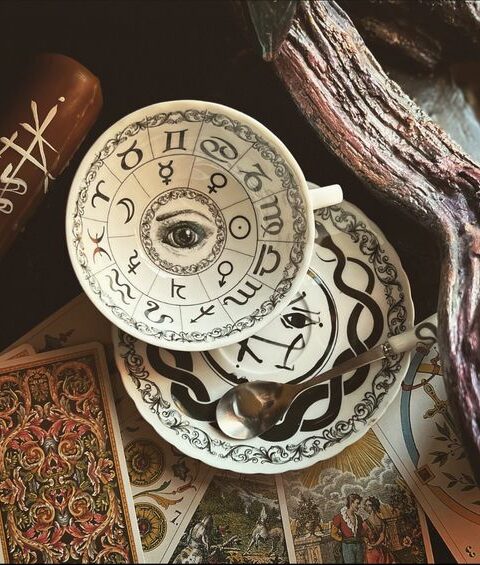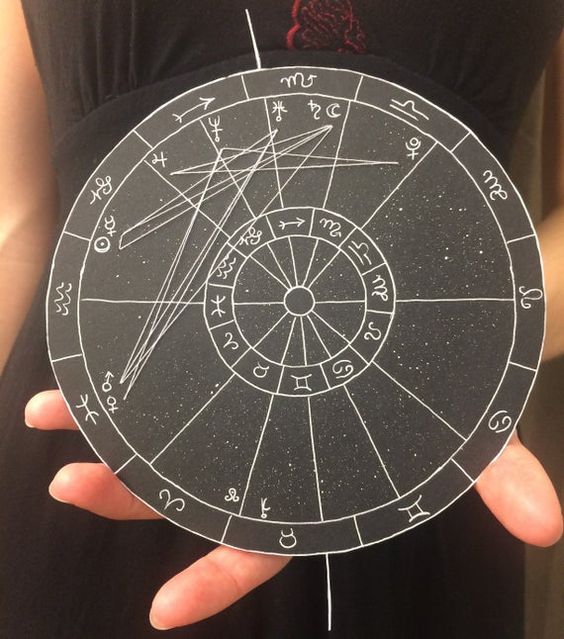
Nebulous Neptune
 In astrology, Neptune is often associated with the otherworldly and the elusive, ruling over phenomena that defy boundaries and definitions. It is linked with concepts that are inherently unclear, vague, and hazy—terms that epitomize the nebulous nature of this planet. Its mystique is not only compelling but also deeply symbolic, representing the planet’s dominion over the undefinable aspects of our existence. It encompasses the boundless and the infinite, inviting us to explore beyond the limits of the known world. Neptune’s energy encourages us to dream and to transcend the mundane aspects of life by a deep connection to the sublime. It invites us to envision life not as it is but as it could be, often through inspiration, dreams, art, and mysticism. However, this same power can also obscure our perception of reality, casting a fog of deception and creating illusions that complicate our relationship with the truth. Neptune has the ability to dissolve the rigid structures of our reality and to enlarge our horizons. It beckons us to view the world through rose-colored glasses, potentially leading us into a realm of enchantment where the lines between reality and fantasy blur.
In astrology, Neptune is often associated with the otherworldly and the elusive, ruling over phenomena that defy boundaries and definitions. It is linked with concepts that are inherently unclear, vague, and hazy—terms that epitomize the nebulous nature of this planet. Its mystique is not only compelling but also deeply symbolic, representing the planet’s dominion over the undefinable aspects of our existence. It encompasses the boundless and the infinite, inviting us to explore beyond the limits of the known world. Neptune’s energy encourages us to dream and to transcend the mundane aspects of life by a deep connection to the sublime. It invites us to envision life not as it is but as it could be, often through inspiration, dreams, art, and mysticism. However, this same power can also obscure our perception of reality, casting a fog of deception and creating illusions that complicate our relationship with the truth. Neptune has the ability to dissolve the rigid structures of our reality and to enlarge our horizons. It beckons us to view the world through rose-colored glasses, potentially leading us into a realm of enchantment where the lines between reality and fantasy blur.
Neptune’s realm is one where reality bends, shifts, and flows like water, elusive and ever-changing. Its energy blurs the edges of our perceptions, blending the real with the fantastical until the lines are beautifully indistinct. Here, we can drift into the world of dreams, where our consciousness expands, untethered by the gravity of the ordinary. It’s where imagination reigns supreme, where creativity is sparked by the divine muse and visions are born, vivid and profound. However, Neptune’s gifts come with a warning. It obscures not only the world’s harshness but also its reality. It shows us paradise and dreams fulfilled, but can just as easily lead us into a deception, where shadows masquerade as truths and illusions feel real. Under Neptune’s influence, we are invited to explore the vast, uncharted territories of our psyche, to venture into the depths of our intuition and spirituality. It’s an invitation to find magic in the mundane, to see the world through a lens that reveals the divine in the everyday. But always, always, with a touch of skepticism, a questioning mind that seeks the truth beneath the shimmer.
Neptune takes us into the expansive landscapes of our inner visions and dreams. It acts as a guide, leading us through our subconscious and the fantasies we dare to dream. Its energy is particularly evident in the ways we engage with stories and art. Neptune empowers us to fully immerse ourselves in the worlds of books, films, and other forms of storytelling. It is the force that allows us to suspend disbelief, to dive headlong into the plot and character without reservation.
Art, in particular, is presented as a vessel through which this reconnection occurs. The act of creation is linked to the deciphering of symbols, the channeling of inspiration, and the transcending of ordinary boundaries. Artistic endeavors unlock the doors of imagination, allowing us to venture into the enigmatic territories of wonder and enchantment and challenge the borders of our perceived reality.
Through Neptune’s lens, we not only observe but become part of the story, feeling the emotions, challenges, and triumphs of characters as if they were our own. This deep immersion is Neptune’s power to blur the lines between reality and fiction, enhancing our empathy and understanding through imaginative experiences. In the glamorous world of film and visual media, Neptune’s role is twofold. It not only inspires the creation of compelling, dream-like images but also influences the audience’s perception, making the glamour more intoxicating and the illusion more convincing.
Glamor, that dazzling mirage of perfection is Neptune’s gift to our earthly existence. Under its spell, we see the world not as it is, but as it could be—a place of infinite beauty and possibility. But, like all things touched by Neptune, glamor is both a blessing and a beguiling illusion. It invites us to see beyond the surface, to find the magic within the mundane, but also warns us of the dangers of mistaking the illusion for reality. Neptune fuels our creativity, allowing us to dream and imagine without bounds, to see the potential for magic in every corner of our existence. Yet, it also beckons us to tread carefully, to recognize when the dream becomes a mirage, when the make-believe threatens to obscure the truth. In the world of artistic expression, it encourages us to dive into the depths of our imagination, to explore the uncharted territories of our inner worlds, and to bring forth creations that are as boundless as our dreams. But it also reminds us to stay grounded, to ensure that our creations, no matter how fantastical, are rooted in the truth of our experience.
Neptune’s Shadowy Realm
However, within Neptune’s realm shadows also take form. The urge for escapism can morph into a manifestation of denial, individuals avert their gaze from harsh truths that lay bare the flaws and fractures in their lives. The siren call of escapism calls, encouraging the evasion of problems that demand confrontation. In this guise, Neptune’s energies might guide those under its sway to blind themselves to what is truly amiss, creating a poignant paradox where the transient nature of illusion overshadows the harsh light of reality. Moreover, Neptune’s longing for transcendence can manifest in ways that prove destructive. We over-indulge in fantasies, substances that alter perceptions, and to seek refuge in the haze of intoxication, which may lead down dangerous paths. Such pursuits, while momentarily appeasing the soul’s yearning for an alternative reality, can ultimately lead to a disintegration of the very essence of one’s being.
Neptune is the realm where dreams turn to illusions and the pursuit of the sublime becomes a troubling descent into denial. It’s all too easy to lose oneself, to drift away on waves of wishful thinking and neglect the harsh truths that lie just beneath the surface. This is where the urge for escapism takes root, where individuals might choose the comforting cocoon of pretense over the stark, often painful, reality of their lives. The frantic escape from reality leads individuals to seek refuge in substances that alter their perceptions, numbing the pain but also obscuring the truth. The initial euphoria of altered states can spiral into the abyss of addiction. The temporary escape found in intoxication can lead to a disintegration of self, where the boundaries between reality and fantasy blur until they are no longer discernible. Neptune’s promise is seductive, but its darker face reveals the fragility of our desires. If unchecked, it can lead us to forsake the very foundations of our existence. It’s the ultimate irony—seeking to escape our flaws, we may only deepen them, turning the cracks into chasms. The mysticism behind Neptune’s influence is seen as a force yearning to reunite the fragmented aspects of the soul – a spiritual calling to mend what has been lost or forgotten.
Neptune’s influence in the chart deepens within its house placement, along with the thickness of the fog it creates. Clarity becomes elusive, and discerning the true nature of events and situations becomes a challenging task.
In the first house, Neptune casts its dreamy veil over our very identity, encouraging the expression of empathy and artistic gifts, but also prone to self-deception and boundary issues. In the second house, our values and material security can become nebulous, challenging us to find spiritual wealth beyond the physical, yet risking impracticality in financial matters. The third house, with Neptune’s influence, turns our communication and thought processes into an imaginative stream, rich with imagination yet vulnerable to misunderstanding and miscommunication. In the fourth house, Neptune’s presence transforms our home and family life into a place of emotional depth and compassion, while also potentially stirring dreaminess, familial illusions and escapism. When Neptune is in the fifth house, it enhances our creative expressions and romantic pursuits with a touch of idealism, though it may also lead us into fanciful infatuations and unrealistic expectations. In the sixth house, Neptune’s influence on our work and health routines encourages a holistic, intuitive approach, but also necessitates vigilance against disorganization and neglect. In the seventh house, partnerships become a realm of soulful connection and unconditional love, yet also a space where boundaries blur and projections thrive. The eighth house under Neptune’s spell turns our experiences of intimacy, transformation, and shared resources into profound journeys of soul merging, though it also hides the risk of financial deceit and emotional entanglement. Neptune in the ninth house awakens a quest for higher truths and spiritual wisdom, inspiring travel and philosophical exploration, yet caution is needed against gullibility and dogmatic escapism. The tenth house sees Neptune blending our career and public image with idealism and compassion, though it also brings challenges in defining clear professional goals and maintaining realistic ambitions. In the eleventh house, Neptune’s influence on friendships and social visions fosters utopian ideals and collective dreams, but also calls for awareness against disillusionment and misplaced trust in groups. Lastly, Neptune in the twelfth house envelops our subconscious and hidden realms in a mist of deep intuition and spiritual awakening, while also highlighting the potential for self-deception and escapism.
Different people react to Neptune’s influence in different ways. For some, the nebulous side of Neptune is felt more strongly, causing feelings of uncertainty, disillusionment, and a struggle to grasp reality. These individuals might find themselves struggling with a sense of being lost in the fog, unsure of which direction to take in their lives. Alternatively, there are those who experience Neptune’s influence as uplifting and spiritually enlightening, and they may become attuned to subtle energies beyond the material world.
Neptune’s symbolism extends further, encompassing the realms of psychic and physical disintegration. It represents both the dissolution of boundaries between the conscious and subconscious mind, as well as the potential for spiritual growth and understanding. This is mirrored in its role as a revealer of inner truths that have always dwelled within us, just beyond the reach of articulation.
Richard Idemon says,
Neptune is one of the channels through which we tune into the collective unconscious, picking up all sorts of feelings out of the air, such as feelings of psychic pain, angst and fear – emotional states that we can’t quite label or which come from God knows where. Through the Looking Glass
Swimming in the Sea of Neptune’s Influence
As one of the outer planets, Neptune offers us a key to unlock a super realm of experiences that can be both uplifting and distressing, depending on how we handle its currents. When Neptune’s energy touches our lives, it’s as if we’re entering a dreamlike state where the boundaries of our perception become hazy and nebulous. This planet invites us to peer into the kaleidoscope of misunderstandings, delusions, and illusions that can cast a spell over our existence. During these periods, the grip on our ability to function effectively in the real world weakens, and we find ourselves swimming in the sea of Neptune’s influence.
At the onset of a Neptune transit, a creeping dissatisfaction with the ordinary and the mundane may begin to seep into our consciousness. This initial inkling of discontent might manifest as a sense of loss, despair, or confusion. As the influence deepens, our once clear sense of boundaries starts to blur, and the world around us appears to dissolve, leaving us adrift in a vast sea of uncertainty. It’s as if Neptune urges us to yearn for the unattainable, seeking perfection in a reality that is inherently flawed.
Yet, this yearning for perfection comes at a cost. Neptune’s influence is often accompanied by a lack of discrimination, making us excessively accepting of others while turning a blind eye to their faults and flaws. Our grasp on reality becomes tenuous as Neptune distorts our memories and perceptions, leading us to remember events that never transpired and recount conversations that were mere figments of our imagination. This susceptibility to Neptune’s illusions can also lead us astray, making it easy to mislead others and fall prey to the deceptions of the world around us.
Neptune’s Magical Waters
Neptune, often depicted as a fountain of magical waters has enamored human imagination for centuries. Those who partake of its mystical waters are offered a respite from enduring pain that resonates deeply with the human desire for redemption and healing. The symbolism of Neptune becomes a source of comfort; it is believed to have the power to amplify one’s insights and accelerate the process of emotional and spiritual restoration. This connection between water and rejuvenation underscores the ancient belief in the healing properties of water bodies, which have long been revered across cultures for their ability to mend both physical ailments and the wounds of the soul.
Yet, just as one is drawn to Neptune’s ocean, there is a warning that Neptune’s enchantment can tempt individuals into a world of deceptive euphoria, akin to a “super high.” This world, however enchanting, conceals the treacherous undertow of exploitation and vulnerability, akin to being caught in a merciless current pulling one deeper into darkness. It is important to maintain a balanced perspective and not allow oneself to be entrapped by the seductive pull of Neptune’s realm, as it could lead to losing touch with reality and falling victim to one’s own deceptions.


























 Venus-Pluto Synastry: A Love So Powerful That It Might Just Kill Them
Venus-Pluto Synastry: A Love So Powerful That It Might Just Kill Them
 The Pisces Woman
The Pisces Woman
 A Planet in the 8th House: Gets Into the Same Situations Over and Over. It Has to Do With Its Connection to the Dead!
A Planet in the 8th House: Gets Into the Same Situations Over and Over. It Has to Do With Its Connection to the Dead!
 Pluto-Sun Transits: What’s Changed?
Pluto-Sun Transits: What’s Changed?
 Pluto Transits the 8th House: Major Life-Altering Undertakings
Pluto Transits the 8th House: Major Life-Altering Undertakings
 Astrology Degrees and Meaning
Astrology Degrees and Meaning
 Mars-Pluto Synastry: Something Quite Dark and Dangerous
Mars-Pluto Synastry: Something Quite Dark and Dangerous
 Uranus Transits the 4th House: The Chaotic Path to Personal Inner Growth
Uranus Transits the 4th House: The Chaotic Path to Personal Inner Growth
 Pluto in Libra in the 2nd House: Lessons on Self-Worth and Financial Independence
Pluto in Libra in the 2nd House: Lessons on Self-Worth and Financial Independence
 South Node in Scorpio or 8th House
South Node in Scorpio or 8th House
 Pluto Transits the 1st House: What to Expect?
Pluto Transits the 1st House: What to Expect?
 Sun Square Pluto Synastry: You’ve Got That Power Over Me
Sun Square Pluto Synastry: You’ve Got That Power Over Me
 Composite Sun in the 8th House: Weather the Storm
Composite Sun in the 8th House: Weather the Storm
 Venus Opposite Saturn
Venus Opposite Saturn
 Aquarius: What Does Consciousness Mean to Them?
Aquarius: What Does Consciousness Mean to Them?
 Uranus Transits: 1st House: Winds of Change:
Uranus Transits: 1st House: Winds of Change:
 Love’s Mirage: The Sun- Neptune Synastry Influence
Love’s Mirage: The Sun- Neptune Synastry Influence
 Moon-Saturn Synastry
Moon-Saturn Synastry
 Mercury Trine Pluto Synastry: Into the Rabbit Hole
Mercury Trine Pluto Synastry: Into the Rabbit Hole
 Pluto in the 1st House: Body Language Tips (Gifs)
Pluto in the 1st House: Body Language Tips (Gifs)